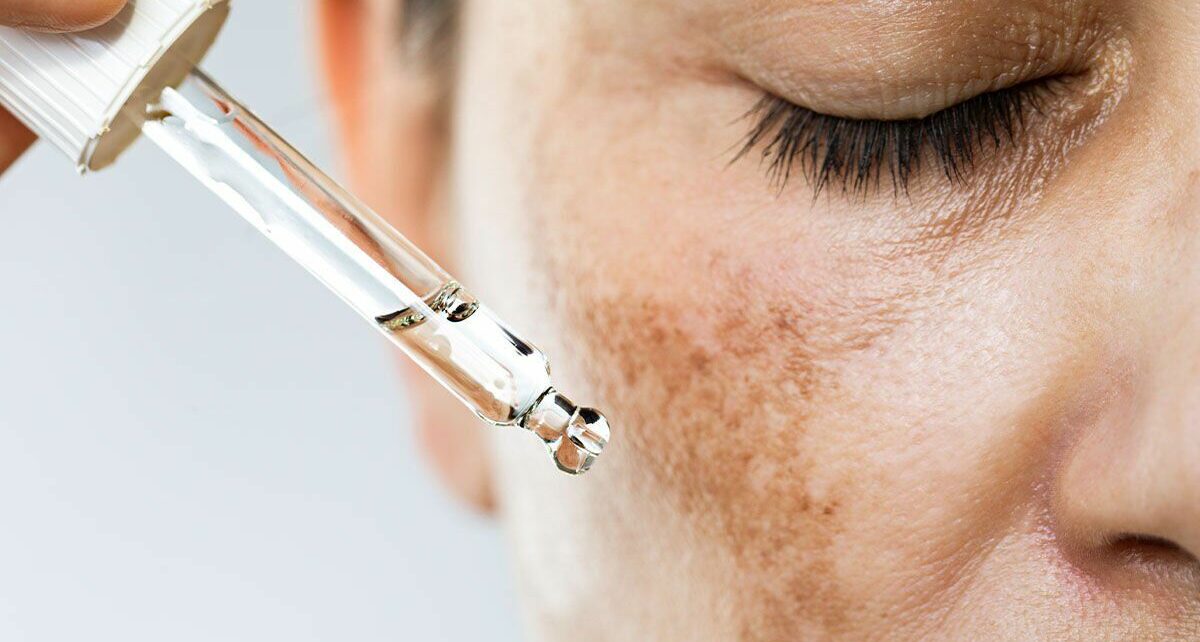
Sunlight helps the skin make essential vitamin D but it can also cause significant damage when UV rays are high. Before levels creep up in summer, skin cancer expert Dr Paul Banwell noted that spring is a great time to address existing pigmentation from last year, without increasing sensitivity. And according to the skin expert, it’s easy to remedy using one key ingredient – vitamin C.
While summer is when some people find their complexion is at its best, skin cancer expert Dr Paul Banwell who runs The Banwell Clinic, noted that ultraviolet light can damage the outer layer of the skin.
The expert, who is the previous head and founder of the Melanoma and Skin Cancer Unit (MASCU) in East Grinstead, explained that “too much UV exposure” can “hit the deeper layers of the skin” and damage the cells.
He said: “Damage to the skin presents itself in a number of ways. The obvious, most immediate way, is that you will look red and could get sore sunburn. You might not realise you have burned until you go back inside. The skin can look blistered and feel itchy and tight.
“It can also lead to dark spots. The sun can dry out the skin and deplete levels of essential fatty acids, leaving it looking dry and flaky.”

Spots caused by sun damage are known as hyperpigmentation, which commonly manifests as brown, black, grey or sometimes red spots.
Also known as age spots, liver spots or more simply as sun spots, the dark flat patches can leave skin looking blemished and congested – and are particularly common in those over 50 years old.
Most spots are different to potentially cancerous moles, melasma, or freckles and don’t need removal, though they can be lightened for cosmetic reasons. And according to Dr Paul, vitamin C is the perfect remedy.
He explained: “Retinol is a good choice to help a dull complexion but vitamin C is also key when it comes to reducing pigmentation – and it can add brightness and glow – just perfect as the sun starts to shine!”
Don’t miss…
Shoppers love No7 serum that leaves ‘fine lines less visible'[LATEST]
Expert amazes with tutorial on how to ‘look younger using makeup’[REVEAL]
How to look a decade younger with seven incredible makeup hacks[INSIGHT]
Paul added: “The key point is that the chemical enzymatic pathway for pigmentation is complex and various ingredients target one of some of the steps but not all. A multipronged approach is therefore required.
“Vitamin C is a key ingredient to effectively treat hyperpigmentation because of its powerful antioxidant properties and its ability to inhibit melanin formation. I also recommend retinol products, which can be applied topically to lighten the skin and reduce the appearance of hyperpigmentation.
“However, you must be careful with retinol, because it can cause bad sunburn as it encourages new skin cells to develop.”
For immediate application, Dr Banwell recommended Rationale’s Super Antioxidant Ace Serum which can “fade pigmentation” and “augment skin moisturisation”.

Niacinamide can also help to reduce pigmentation by reducing the transfer of melanin from the pigment cells to the skin cells.
While these ingredients will work over time, chemical peels offer more fast-acting results for mature skin types.
With age, skin cell turnover and renewal slow down, though chemical peels speed up this process by removing the top layers of skin.
Careful use can help treat dark spots and pigmentation issues as the cells renew, according to Dr Banwell.
He warned: “Only lighter peels should be used at home. They can cause side effects like redness and irritation as well as sun sensitivity.”
In addition to using products formulated with vitamin C and other “key ingredients”, natural remedies can also reduce hyperpigmentation. The skin expert explained that apple cider vinegar can lighten pigments due to the acetic acid content – almost like a mild peel.
Paul said: “Applying aloe vera gel directly to the pigmented skin may also be a good way to reduce pigmentation over time. Aloe vera contains aloin, a natural depigmenting compound shown to lighten skin and work as a hyperpigmentation treatment.
“Another natural ingredient is liquorice extract, which can help improve hyperpigmentation by dispersing the melanin.”
Source: Read Full Article


